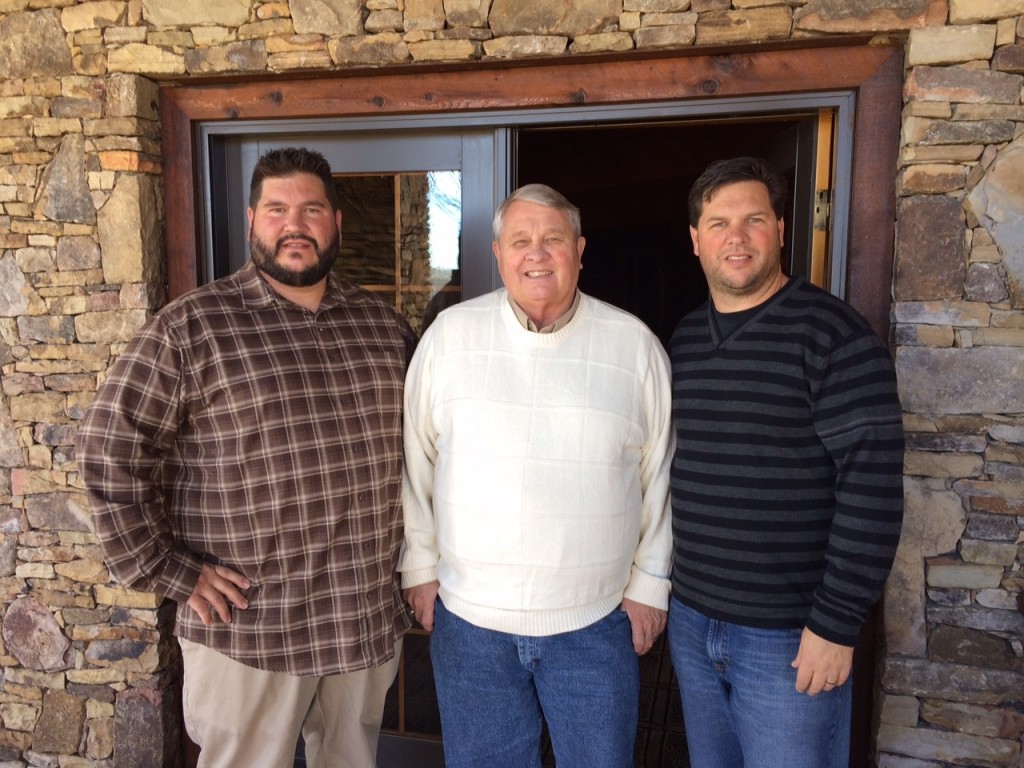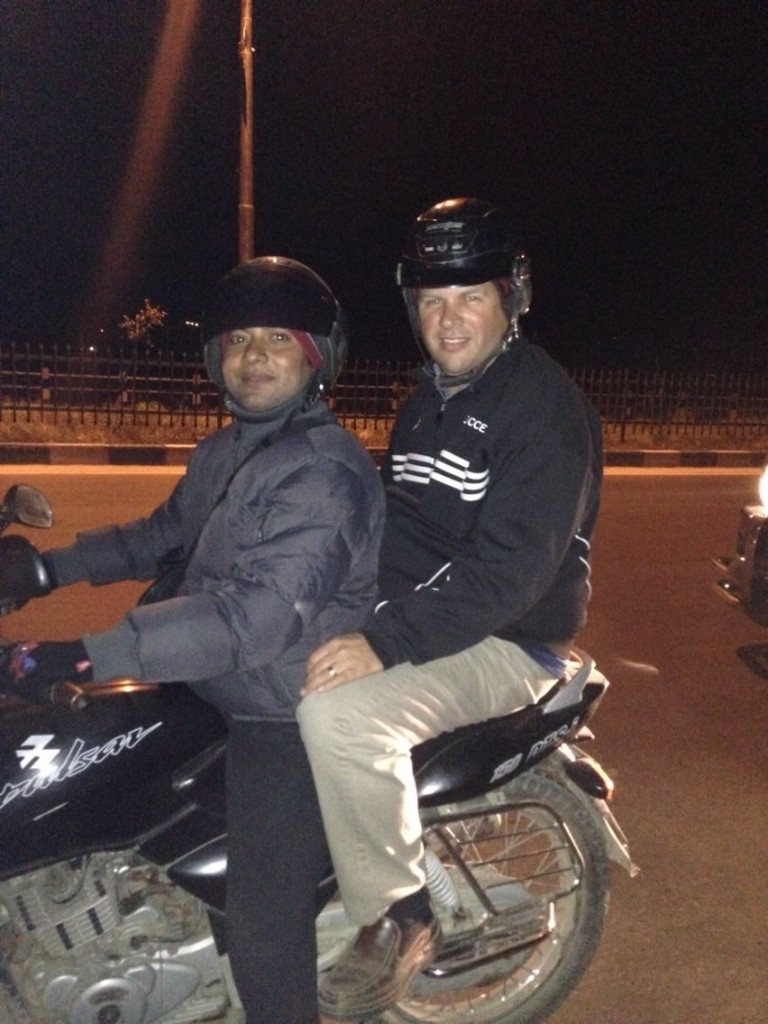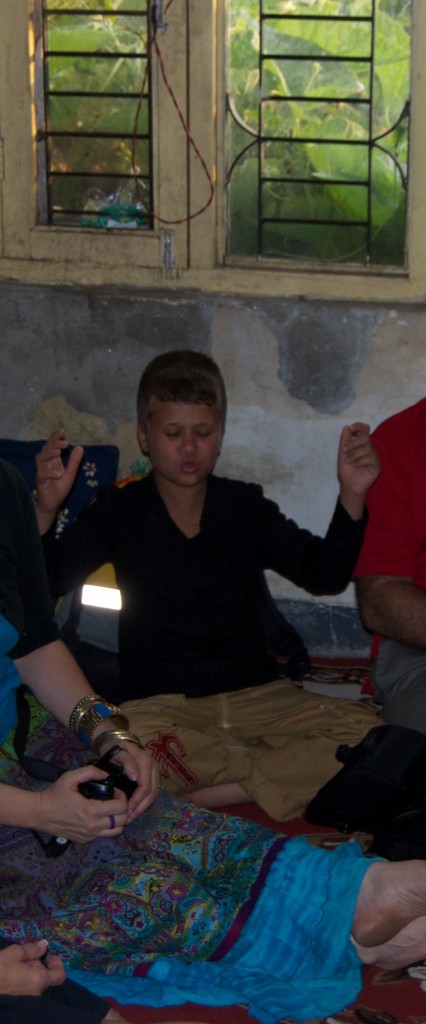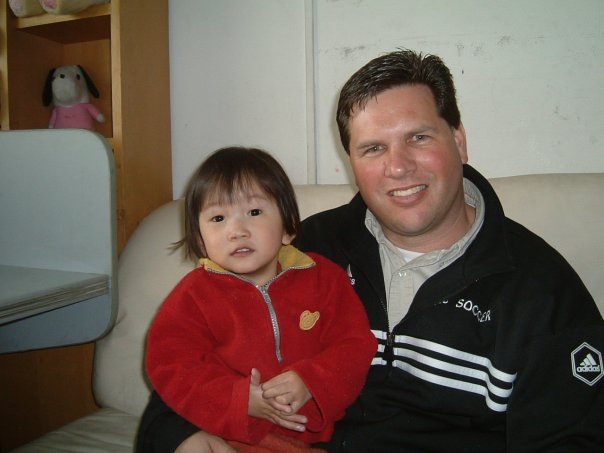Oblivious, that was me! I don’t think I should have been. At the time, I was serving as an Outreach Pastor, my wife and I had just completed a three year adoption journey to bring our daughter home from China and our church had participated in Orphan Sunday.
Just over a month after we brought our daughter home from China, I attended my first Summit Conference, put on by Christian Alliance for Orphans. This particular year, the conference was held at Saddleback Church in Southern California.
Through our own adoption journey and my role as an Outreach Pastor, God was really stirring in my heart to engage our church at a deeper level to care for orphans. Because of our own adoption journey, the focus we had presented to our church was primarily on adoption. I also began to realize, many of our international ministry partners were already caring for orphans in a variety of ways.
One of my goals at the conference was to research and learn ways we could begin to implement an orphan care ministry at our church. I was especially excited to attend one of the breakout sessions at the conference entitled, Building Church Ministries 101: Launching a Church Orphans’ Ministry.
There was a large turnout for this particular session as many churches had interest in engaging more into the orphan care crisis. What I quickly learned in this session was, the audience was mostly made up of lay people who had a passion for orphans. It didn’t take long to sense a common frustration amongst many of these lay people about the lack of support from their pastors about orphan care ministry.
Now there might have been more pastors present at the session, but they likely were staying quiet like I was out of fear of not making it out of the building alive.
Even though I was a pastor myself, I could certainly understand their frustrations as I was experiencing some of this same type of pushback or lack of interest in my efforts to introduce an orphan care ministry.
This was my first experience to witness a widespread lack of support amongst pastors on a topic that couldn’t have a more clear Biblical mandate, caring for orphans and widows in their distress.
Just one day later at the conference, I can safely say my world was rocked, in a big way. We watched the debut of a brand new documentary called, Faultless: The American Orphan. I don’t know how I could have been so oblivious to the foster care system in my own country, but I was.
I had no idea that at any given time in our country, there can range between 400,000 to 500,000 children in the custody of the state. Of this larger number of children, at any given time, close to 100,000 of these children are eligible to be adopted. Simply put, the parental rights of those 100,000 children have been terminated.
The title of this documentary speaks for itself. These children, through no fault of their own have been neglected, abused and are in situations bad enough that those outside their worlds notice there is something dreadfully wrong.
The sad reality is, our society and culture have masked that we actually have orphans living amongst us. I understand the sensitivity of how we label these children, but have we gone so far to protect them that now we don’t even know they exist? These children go to school with our kids, they live in our neighborhoods, but do we even know they are there?
What I was so struck by was the heartbreaking statistics of vulnerable children who are placed into the foster care system. Let these statistics sink in:
- 80% of children in foster care have physical or mental health issues
- 70% of the current US prison population has spent time in foster care
- 80% of death row inmates have been in foster care
- 65% of the US homeless population has spent time in foster care
- 51% of foster kids will be unemployed after aging out of the system
- 71% of girls who have been in foster care will be pregnant by the age of 21
- 60% – 70% of those caught in sexual human trafficking in the US have spent time in foster care
- Only 3% will attend college
This information rocked my world! Again, how could I be so oblivious to the realities of children who live in the smallest of rural communities, to the largest cities in our country, and everywhere in between?
In light of these staggering statistics, where does The Church fit into this crisis? The sad reality is, the frustration with pastors I was exposed to in the breakout session at Summit many years ago, is one I have now experienced on a wider scale personally as we have worked to engage churches in orphan care through our ministry, Faces With Names.
Having served previously as a pastor for many years, I understand the overwhelming work load many pastors already are facing. Having served as an Outreach Pastor, I also understand the numerous requests pastors and churches receive on a weekly basis.
A common response I often receive from pastors is, we are already doing too much. My question is, what if you are doing too much of the wrong things? Other pastors I speak too are narrowing their focus to such a small degree, there is no room to even consider another ministry option.
Either way, so many churches have eliminated a sacred space and left little to no room for something so close to the heart of God.
The unfortunate reality is, we will either deal with these children now, or we will deal with them later as adults. If Christian families and churches would be willing to step into their lives at a young age, there is more of a chance to see healing and restoration in their already broken lives.
Statistics show, the longer a child is in the foster care system, and the more placements or homes they have lived in, the more likely they become one of the unfortunate statistics listed above.
If we deal with them later, they will likely be the ones selling drugs in our towns, stealing our cars, breaking into our homes, selling their bodies voluntarily or involuntarily and making up a large percentage of those filling our prisons, living homeless on our streets, and requiring assistance from the government.
I often hear from DHS workers how they have worked with grandma, mom and now the children. The generational cycle of poverty, destruction and addiction is not only robbing these families of their God given potential, it is often blinding them of the enormous love God has for each and every one of them.
I love the statement my wife Susan once made and we now use as motivator in our ministry efforts:
“We believe, every time a vulnerable child or orphan is placed in a loving, healthy Christian family, through foster care or adoption, they are literally being snatched out of the hands of the enemy, and given a hope and a future.”
I know the hearts of most pastors is to reach the lost and to see peoples lives transformed. When we pray for revival in our towns and in our churches, are we only praying for those who will come in and make an immediate positive impact in the lives of our churches? These new people we have been praying for will provide leadership, they will serve, they will tithe, they won’t cause the pastor any headaches or additional work.
If we are honest with ourselves, this would be our selfish prayer. But what about those vulnerable families and kids who are not easy to deal with? If The Church is really going to be the answer to the foster care crisis, it will likely be more compared to taking up our cross daily for the sake of others than it will be easy wins.
Amazingly enough, that is exactly what Jesus called out for His followers to do, take up our cross daily. Not a popular subject most of the time, even to pastors. I write this blog with a continued desire to bring awareness to pastors and churches, there are vulnerable kids and families who desperately need our help!
But I must admit, I also write this blog with a bit of frustration at pastors who are ultimately the gatekeepers of what ministry transpires in their churches and are unwilling to even consider caring for orphans and vulnerable kids. I certainly understand how orphan care can seem like a very peripheral ministry idea.
But consider this, as pastors, have you ever tried to explain to a person who has never tithed before, why it is important to tithe? Tithing is a concept on many levels that makes no human sense and is often hard to explain why one should participate.
I equate orphan care for the church in the same way I equate tithing for the believer.
It might not make sense, but in God’s economy, it is better to participate than to not participate.
I love this quote I heard Andy Stanley make as he was addressing foster families at his church, NorthPointe.
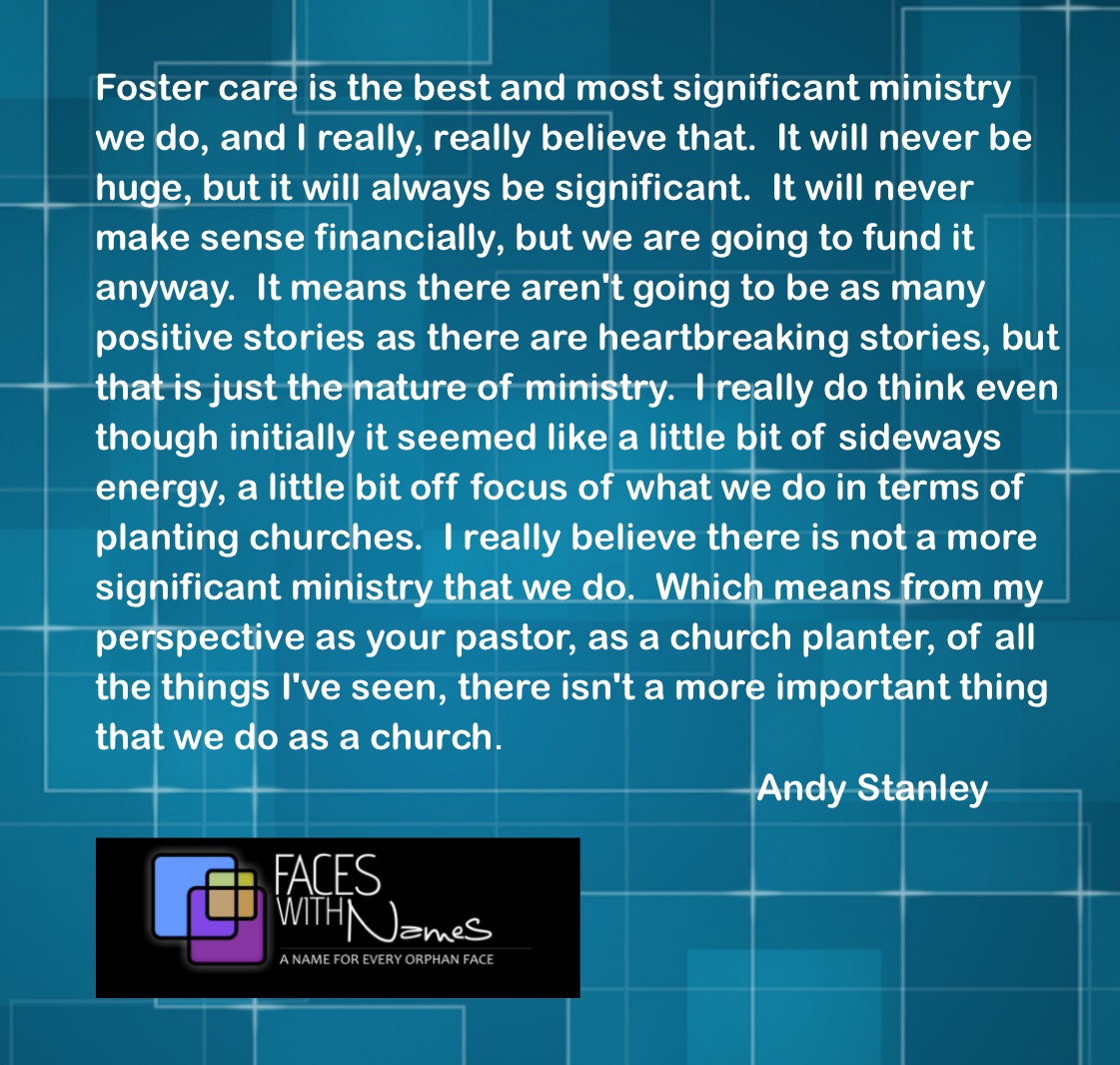
“Foster Care is the best and most significant ministry we do, and I really, really believe that. It will never be huge, but it will always be significant. It will will never make sense financially, but we are going to do fund it anyway. It means there aren’t going to be as many positive stories as there are heartbreaking stories, but that is just the nature of ministry. I really do think even though initially it seemed like a little sideways energy, a little bit off focus of what we do in terms of planting churches. I really believe there is not a more significant ministry that we do. Which means from my perspective as your pastor, as a church planter, of all the things I’ve seen, there isn’t a more important thing that we do as a church.” Andy Stanley
I appreciate this heartfelt expression from Andy Stanley on the importance and significance of churches participating in caring for vulnerable children through foster care. The reality is, starting an orphan care/foster care ministry already parallels many of the ministries you already have in place. I have said to many pastors now to date, all we need is your support.
You already have people in your church who are passionate about caring for orphans and vulnerable kids. Support them, unleash them, and watch how God blesses every aspect of what you are doing through your church.
There is this pesky little verse we find in Matthew 25:40 where Jesus said, “Truly I tell you, whatever you did for one of the least of these brothers and sisters of mine, you did for me.”

To those lay people who are frustrated, stay encouraged, and pray for your pastor. For pastors who are not interested in orphan care/foster care yet, would you ask God how He might want you to lead your church in caring for the most vulnerable amongst us? For the pastors and churches who get it, thank you! It’s not easy, but it’s worth the effort.
Every negative statistic from foster care represents an individual. Every one of those individuals has a face, with a name. Their real life stories can be swept into the abyss of negative statistics, or they can be embraced by loving families, from loving churches who can introduce a Jesus who can bring healing, restoration and salvation to all things broken.
I was Oblivious! Are you?
Faces With Names, serves as a catalyst ministry to engage and equip churches to create the culture of orphan care through foster care, adoption and global orphan care. To learn more about how we can serve your church to help care for orphans and vulnerable kids, please visit our webpage: www.faceswithnames.org
Craig Groeschel – “Orphans Embraced” Every child in need has a face, a name and a story.





